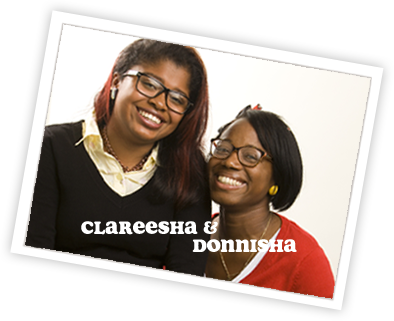Clareesha and Donnisha
 Clareesha and Donnisha share a bond that their rhyming names accentuate. They are two women of color who have benefitted from Beyond Emancipation’s services, but also from one another. Their sypmpatico relationship is clear: as they engage in spontaneous bursts of synchronized laughter and complete each other’s sentences, talking with this pair is more like witnessing a conversation than a formal interview. Clareesha and Donnisha are a living example of the notion of permanency, or belonging.
Clareesha and Donnisha share a bond that their rhyming names accentuate. They are two women of color who have benefitted from Beyond Emancipation’s services, but also from one another. Their sypmpatico relationship is clear: as they engage in spontaneous bursts of synchronized laughter and complete each other’s sentences, talking with this pair is more like witnessing a conversation than a formal interview. Clareesha and Donnisha are a living example of the notion of permanency, or belonging.
For foster and emancipated youth, developing and nurturing permanent, supportive relationships – or “permanency” – is important, and especially critical as one prepares to leave care. According to one youth, “It’s really important to make sure before emancipating a youth that they have one person. If I have somebody that I know I can depend on, that loves me and cares that I wake up tomorrow and am still breathing, I can get through it. I can walk through it.” (California Permanency For Youth Project, 2004)
 Children who are raised by their own families often have built-in permanent connections – most often their parents – that offer them this kind of love, stability and commitment. Many foster youth, especially those who experience numerous placement changes, do not. But, says B:E Executive Director Rick McCracken, “permanency is much more than a parent situation. It’s about developing long term healthy relationships with people in your life who will celebrate your victories with you.” Secure relationships may be found in mentors, adoptive parents, or distant relatives. But, as McCracken emphasizes, fellow foster youth often fill this role for each other.
Children who are raised by their own families often have built-in permanent connections – most often their parents – that offer them this kind of love, stability and commitment. Many foster youth, especially those who experience numerous placement changes, do not. But, says B:E Executive Director Rick McCracken, “permanency is much more than a parent situation. It’s about developing long term healthy relationships with people in your life who will celebrate your victories with you.” Secure relationships may be found in mentors, adoptive parents, or distant relatives. But, as McCracken emphasizes, fellow foster youth often fill this role for each other.
Donnisha and Clareesha are former foster youth enrolled at Cal State East Bay. They both overcame serious challenges to beat the odds and pursue higher education. Donnisha’s mother died when she was eight years old. Her father, who was battling a drug addiction, could not take care of her; other relatives were unreliable. She ended up living with an aunt and uncle, but never felt particularly close to them.
Born while her mother was in jail, Clareesha never knew either of her birth parents. She was raised by her great aunt and uncle in Oakland, while the rest of her family were in Sacramento. She never knew most of her relatives. “I don’t really have a bond, like a family bond, with any of them,” she said.
However, Clareesha does find that family-like bond with Donnisha. The two women met in an intensive summer bridge program that helped them prepare for college. By the time they started classes in the fall, they were fast friends and roommates. Their B:E Case Manager, Erica Bell, notes the connection. “They seem more like sisters than friends.”
Although Clareesha and Donnisha have both struggled with school, they’ve been there to support and keep each other focused. They both say that finding the right resources and people to help has been critical. Persistence doesn’t hurt, either. Donnisha said, “Former foster youth…are always saying no one wants to help us, but there are people out there that want to help. Youth need to take advantage of the different resources, gotta make them calls, write those essays. It [does] help, trust me. I know.”
And even though self-advocacy is important, both of these young women know you can’t do it alone.
“If you find a little support, you can make it,” Donnisha said, “All it takes is,”
“One,” Donnisha and Clareesha chorused in unison.
Originally published in Beyond Emancipation News, Fall 2011.

